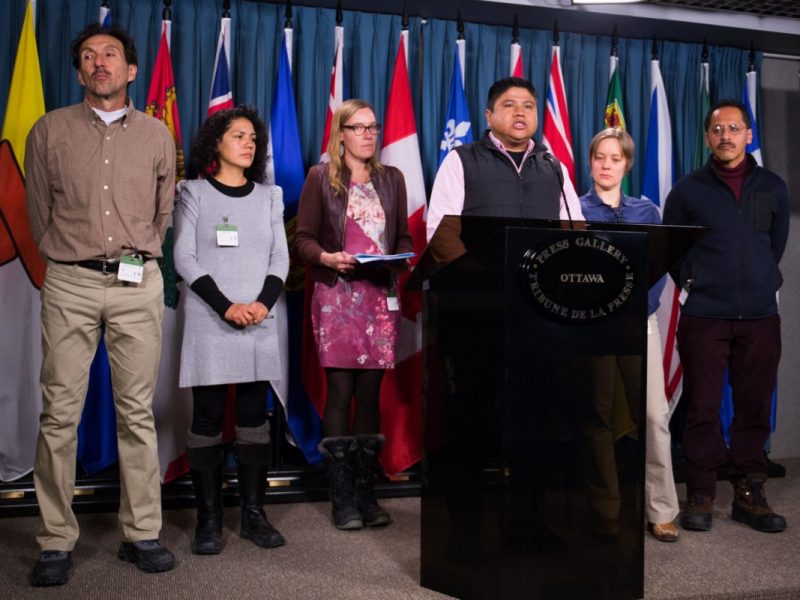
The work of a TRU Law student has sparked a federal proceeding that could have significant implications for the oversight of Canadian embassy operations.
Lavinia Floarea conducted a research project in 2017 in TRU Law Assistant Professor Charis Kamphuis’ Civil Society, Dissent and the Law course.
“I feel very fortunate that I was able to apply what I learned in the classroom to a real-world problem. Not only did I improve my research and writing abilities through this project, but I worked on a task that has real consequences for the affected community,” said Floarea.
The research was conducted for the Justice and Corporate Accountability Project (JCAP), a volunteer network co-founded by Kamphuis, and the work was specifically requested by MiningWatch Canada on behalf of its community partners in Mexico.
It ultimately led to the development of a formal complaint, filed by JCAP to the Canadian Public Sector Integrity Commission (PSIC) on Feb. 5, 2018 in Ottawa. JCAP presented the complaint on behalf of MiningWatch, several Mexican organizations, and the family of Mexican community leader and human rights defender Mariano Abarca, who was murdered in 2009.
The complaint centers around a conflict involving Abarca and Calgary-based mining company Blackfire, which was then operating its Payback Mine in Chiapas, Mexico.
“Between 2008 and 2009, affected communities made serious allegations about the mine’s environmental and human rights impacts,” explained Kamphuis. “They voiced their concerns repeatedly to the Canadian embassy as well as to local authorities. Abarca was an important leader in this movement.”
“The PSIC complaint alleges that the embassy had direct knowledge of communities’ concerns with Blackfire and of the threats and violence that Abarca and others were experiencing. In spite of this, the embassy continued to actively support the company,” Kamphuis added.
“We argue that in doing so, it violated applicable policies in Canada and, through a series of acts and omissions, contributed to the risk of harm that Abarca was facing,” she added.
Floarea’s research, Kamphuis says, was the catalyst for the complaint, as she identified PSIC, a previously unknown avenue, for potential recourse.
“Lavinia’s task was to identify the law in Canada that governs Canadian embassies’ overseas operations. We expected her to document the absence of avenues,” Kamphuis said.
Floarea, however, unexpectedly discovered the opposite.
“We were not previously aware of the PSIC or how it could address the concerns of our organization and our partners in Mexico,” said Jen Moore of MiningWatch.
“I initially came across the codes of conduct that federal public servants must abide by. This led me to the PSIC, which is tasked with ensuring that civil servants abide by these codes and all applicable policies,” said Floarea.
With the winter semester course wrapping up, however, more time was needed to explore the matter and develop the formal complaint.
“I applied for an Undergraduate Research Experience Award Program (UREAP) award and was fortunate enough to receive it. It gave me the opportunity to delve more deeply into this subject and find out whether the PSIC was a viable administrative option.”
The UREAP funding allowed Floarea to continue working to develop the complaint through the summer with additional support from JCAP co-founder Shin Imai of Osgoode Hall and Jen Moore of MiningWatch.
“The purpose of my summer project was to determine the process of filing a complaint with the PSIC; study past decisions and the definition of ‘wrongdoing’; read through 900 pages of documents obtained through federal information requests, then using the relevant facts, draft persuasive arguments,” Floarea recalled.

Shin Imai and Lavinia Floarea.
The case is currently in the hands of the PSIC.
“The commission has a maximum of 90 days to decide whether or not to investigate. If they proceed, that may take up to a year. If not, we can consider applying to the Federal Court for judicial review,” Kamphuis concluded, adding that the complaint has catalyzed the efforts of a social movement among Canadian and Mexican organizations.
The Government of Canada, meanwhile, recently announced it will set up a new Canadian Ombudsperson for Responsible Enterprise (CORE), an office that will investigate complaints about the activities of Canadian companies abroad.
While Kamphuis welcomes this announcement, she clarifies a key distinction: CORE will accept complaints about a company, while the PSIC complaint at hand is concerned with the conduct of Canadian public officials, including embassy staff.
Moore says the case demonstrates the impact that law students can have.
“Lavinia’s work was essential for paving the way for the complaint and then putting it together on the basis of the documentation we have. We couldn’t have done this without her support,” she said.
Floarea has since graduated from TRU Law. She is currently articling at WorkSafeBC and is following the case.
Related:
Justice4Mariano blog
NOW Toronto, March 5: Canadian mining murder in Mexico
Globe and Mail, Feb. 6: Mexican activists ask Ottawa to investigate alleged support of mining firm
Calgary Herald, Feb. 6: Ottawa pledges co-operation in mining complaint over Mexican activist’s slaying
 Pair facing drug charges
Pair facing drug charges 'Eat the rich' vandals strike
'Eat the rich' vandals strike Trapped orca eats seal meat
Trapped orca eats seal meat Searching landfill for woman
Searching landfill for woman Poland urges more spending
Poland urges more spending Cutting rates at own pace
Cutting rates at own pace Israeli strike played down
Israeli strike played down Full Trump jury seated
Full Trump jury seated World's largest election
World's largest election  Investigating pipeline blast
Investigating pipeline blast TikTok testing new app
TikTok testing new app Body Shop explores sale
Body Shop explores sale Warriors ready for Round 2
Warriors ready for Round 2 Kalamalka Bowl cancelled
Kalamalka Bowl cancelled Rockets live to fight on
Rockets live to fight on Hilton teams up with Sia
Hilton teams up with Sia Swift still 'can't forgive' Kim
Swift still 'can't forgive' Kim Grimes to ‘cap the disarray’
Grimes to ‘cap the disarray’




